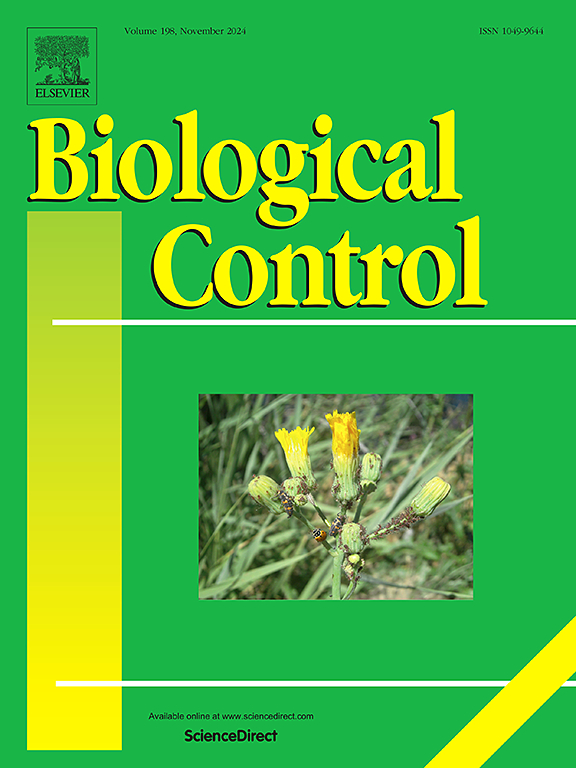Effects of tomato treatments with commercial formulations of entomopathogenic fungi on the pest Tuta absoluta and the predator Macrolophus pygmaeus
IF 3.4
2区 农林科学
Q2 BIOTECHNOLOGY & APPLIED MICROBIOLOGY
引用次数: 0
Abstract
Tuta absoluta is a devasting pest causing severe yield losses in most tomato-growing areas. Macrolophus pygmaeus is a generalist predator released in tomato crop to control T. absoluta. Entomopathogenic fungi are also used on tomato against other pests, but they can play a role in controlling T. absoluta. Therefore, the effects of two commercial products Naturalis® and Mycotal®, based on the entomopathogenic fungi Beauveria bassiana and Akanthomyces muscarius, respectively, on T. absoluta and M. pygmaeus were assessed. In no-choice tests on leaflets, mortality was significantly higher on fungus-treated leaflets for 1st–2nd instar T. absoluta larvae, and not for 3rd–4th instar larvae and for both younger and older M. pygmaeus nymphs. Similarly, in no-choice tests on plants, development rate was significantly lower only for T. absoluta on plants treated with Mycotal®. In two-choice tests, both pest and predator did not show any preference between fungus-treated and untreated plants. Following the laboratory results, Mycotal® was applied also in plastic tunnel cultivation of tomato under field conditions. The number of T. absoluta larvae was significantly lower on plants treated with Mycotal® than on untreated plants, while the presence of M. pygmaeus was not affected by the treatment. Therefore, the use of fungal products together with the predator appears to be a promising strategy for the control of T. absoluta on tomato crop.

用工业配方的昆虫致病真菌处理番茄对害虫绝对白僵虫和捕食者小蠹蛾的影响
番茄螟是一种毁灭性的害虫,在大多数番茄种植区造成严重的产量损失。在番茄作物中放生的小褐蝽是一种控制大褐蝽的多面手捕食者。昆虫病原真菌也被用于番茄防治其他害虫,但它们在控制番茄赤霉病方面发挥作用。因此,本研究以球孢白僵菌(Beauveria bassiana)和白僵菌(Akanthomyces muscarius)为基础,评价了两种商品产品Naturalis®和Mycotal®对绝对白僵菌(T. absoluta)和pygmaeus的效果。在小叶无选择试验中,真菌处理的小叶1 ~ 2龄绝对白腹夜蛾幼虫的死亡率显著高于3 ~ 4龄幼虫的死亡率,而幼龄和老年褐皮夜蛾若虫的死亡率均不高于真菌处理的小叶。同样,在对植物的无选择试验中,只有霉菌®处理过的植物上的绝对T.发育率显著降低。在双选择测试中,害虫和捕食者在真菌处理和未处理的植物之间没有表现出任何偏好。根据实验室结果,Mycotal®也被应用于田间条件下的番茄塑料隧道栽培。与未处理的植株相比,经真菌毒杆菌®处理的植株的绝对白僵菌幼虫数量明显减少,而pygmaeus的存在不受处理的影响。因此,真菌产物与捕食者联合使用是防治番茄白僵菌的一种很有前途的策略。
本文章由计算机程序翻译,如有差异,请以英文原文为准。
求助全文
约1分钟内获得全文
求助全文
来源期刊

Biological Control
生物-昆虫学
CiteScore
7.40
自引率
7.10%
发文量
220
审稿时长
63 days
期刊介绍:
Biological control is an environmentally sound and effective means of reducing or mitigating pests and pest effects through the use of natural enemies. The aim of Biological Control is to promote this science and technology through publication of original research articles and reviews of research and theory. The journal devotes a section to reports on biotechnologies dealing with the elucidation and use of genes or gene products for the enhancement of biological control agents.
The journal encompasses biological control of viral, microbial, nematode, insect, mite, weed, and vertebrate pests in agriculture, aquatic, forest, natural resource, stored product, and urban environments. Biological control of arthropod pests of human and domestic animals is also included. Ecological, molecular, and biotechnological approaches to the understanding of biological control are welcome.
 求助内容:
求助内容: 应助结果提醒方式:
应助结果提醒方式:


